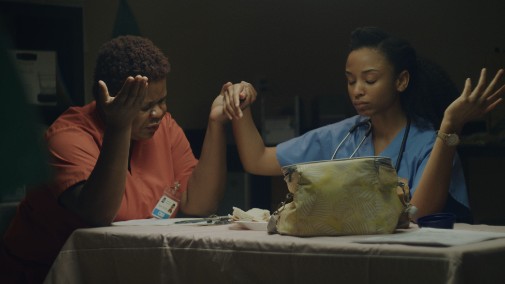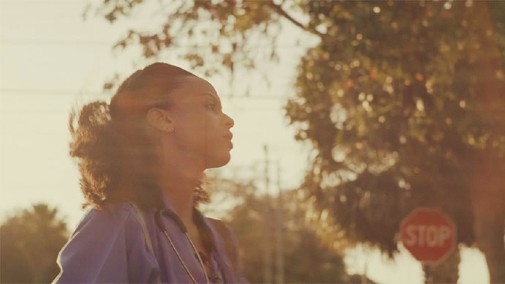SXSW: The cost of work in "Ludi"
 Friday, March 19, 2021 at 2:00PM
Friday, March 19, 2021 at 2:00PM 
The necessity of money rules our lives. Only the chronically wealthy, blinded by the shining gold of privilege, can wave their hands in denial and say it's not important. Need delineates our lives, and hard work is often the consequence of it, obsessively so.
For Ludi, the protagonist of Edson Jean's feature directorial debut, work is everything. How could it be any other way when there's a family, back in Haiti, to help? She's bough into the American dream, the song of hard work and just rewards. However, Ludi has failed to realize she's playing the part of Sisyphus in the story of her life…

Barely able to pay rent to a fellow nurse, Ludi is a healthcare worker living in Miami's Little Haiti neighborhood. To take a day off is impossible for her to contemplate, so hard does she have to work for the measliest of salaries. When we meet her, Ludi has been doing double shifts at the hospital for weeks in a row and the toll of it is wearing down on her. The only respite she finds in this existence of constant exhaustion is the voices of her beloved family who send her audio tapes in lieu of letters.
When presenting these interludes, Edson Jean foregoes the claustrophobic aesthetic of constant close-up and indulges in more free-flowing imagery. It's a breath of fresh air, a kiss of beauty in a cinematic universe characterized by resilience in the face of suffering and little else. The contrast of form emphasizes the contrasts in the character's experience but they also can become tiresome. Like Ludi, we sometimes feel las if we're suffocating, trapped in an experience of placidly abrasive realism.
It's ironic when this single source of joy is what propels Ludi to her breaking point. The Haitian nurse's niece is graduating and asks for money to buy a dress, an innocent request but a financial strain the devoted aunt is unable to afford. In despair, she risks her job by taking on some private sector work, something forbidden by her hospital contract. To make the situation worse, she's hired to take care of an elderly man who'd rather be left alone. The two clash tremendously during a tortuous night that makes up this modest drama's final act.
Despite its wealth of lived-in and well-observed details, Ludi is a film that works first and foremost as an acting showcase. In that regard, I can't recommend it enough seeing as all cast members are delivering exquisite work, from Alan Myles Heiman's bruised pride to Madelin Marchant's nuanced take on a Mephistophelean friend. All that being said, Ludi is the Shein Mompremier show and the actress delivers a gorgeously understated study of perseverance and self-denial, sacrifice by way of sweat, blood, and tears.
Montpremier plays Ludi with the sort of charisma that can electrify the screen, making even the most mundane of activities into a riveting spectacle. As we watch the nurse fight against sleepiness and impatience, as we see her do everything in her power to get the money her niece asked for, we come to understand how Ludi negotiates the daily toll of her job and familial responsibilities. How she plasters on a smile in hopes of hiding her pain from patients, colleagues, herself. Indeed, Montpremier is so good, she manages to solve some of the film's minor failures.
When the protagonist cracks, at long last, the script falters. The text makes the sin of articulating self-realization with artificial clarity, coming off as a theatrical device rather than an organic epiphany about self-care. Thankfully, Montpremier knows how to make false-sounding words taste like the most authentic of confessions. It's remarkable work, the kind which deserves plaudits and awards, a standing ovation too. In this virtual festival, Montpremier may not hear any celebratory claps as she might have in a more traditional presentation, but she has earned them. A wonderful performance!

Ludi is showing at SXSW Online 2021 as part of the Narrative Spotlight section.
 Edson Jean,
Edson Jean,  Ludi,
Ludi,  SXSW,
SXSW,  Shein Mompremier,
Shein Mompremier,  sxsw 2021
sxsw 2021 


Reader Comments